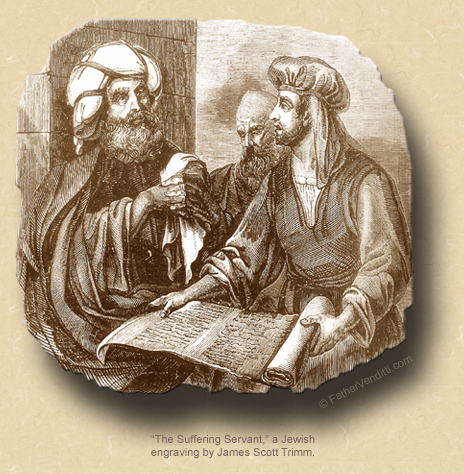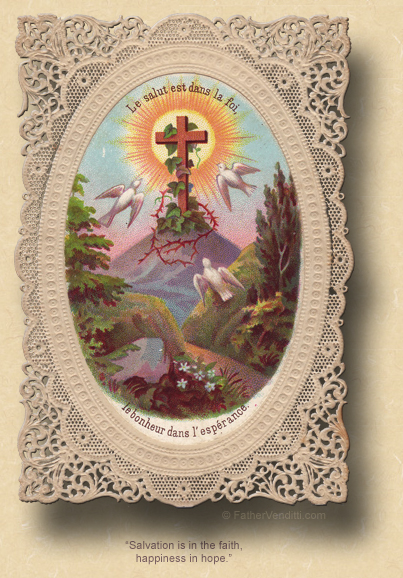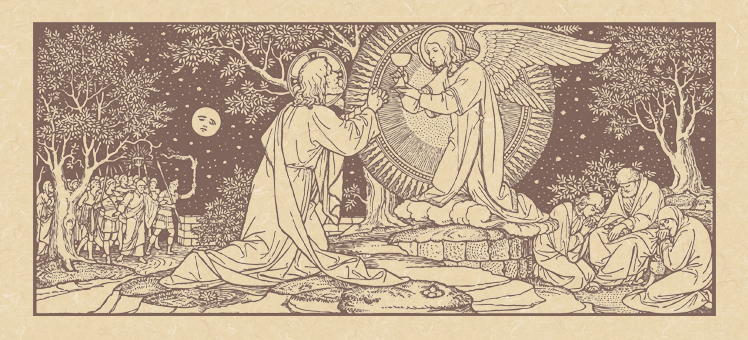Learning How to Process Our Suffering.
The Fifth Wednesday of Lent.*
Lessons from the feria, according to the ordinary form of the Roman Rite:
• Isaiah 49: 8-15.
• Psalm 145: 8-9, 13-14, 17-18.
• John 5: 17-30.
Lessons from the feria, according to the extraordinary form of the Roman Rite:
• Ezechiel 36: 23-28.
• [Gradual] Psalm 33: 12, 6.
• Isaiah 1: 16-19.
• [Gradual] Psalm 32: 12, 6.
• [Tract] Psalm 102: 10.
• John 9: 1-38.
The Fifth Wednesday of the Great Fast; and, the Feast of Our Venerable Father Mark, Bishop of Arethusa, the Deacon Cyril & Their Companions.**
Lessons for the Presanctified Liturgy, according to the Ruthenian recension of the Byzantine Rite:***
• Genesis 17: 1-9.
• Proverbs 15: 20—16: 9.
FatherVenditti.com
|
 8:11 AM 3/29/2017 — You know I'm fond of referring to the readings at Mass as "lessons." I guess it's just the frustrated Victorian in me. But the word applies to today's Gospel lesson exactly, since that's what it is: a lecture or lesson given by our Lord on the subject of Soteriology. But it's only the first half of the lesson, and really needs to looked at in conjunction with tomorrow’s lesson; so, today we're going to focus on something different. 8:11 AM 3/29/2017 — You know I'm fond of referring to the readings at Mass as "lessons." I guess it's just the frustrated Victorian in me. But the word applies to today's Gospel lesson exactly, since that's what it is: a lecture or lesson given by our Lord on the subject of Soteriology. But it's only the first half of the lesson, and really needs to looked at in conjunction with tomorrow’s lesson; so, today we're going to focus on something different.
In point of fact, during our times together in this Holy Season we've focused almost exclusively on the Gospel lessons the Church has presented to us, woefully neglecting the many wonderful Old Testament lessons that have accompanied them, principally because they seem to come from all over the Old Testament. But today's Old Testament lesson is a significant one because it comes from that portion of the Prophesy of Isaiah often called “The Song of the Suffering Servant”; and, you certainly don't have to be a Scripture scholar to guess that the Father's of the Church, in the first four centuries, clearly identified this Suffering Servant with our Lord, Jesus Christ.
This particular section of Isaiah—which is sometimes called “Deutero-Isaiah” because many scholars doubt that it was actually written by the Prophet—was composed sometime during the Babylonian Exile, which was the Hebrew people's darkest hour. Exiled from their homeland without much hope of ever returning, it can be a depressing read if you don't accept the view of the Fathers who saw in it an allegory for the fall of man and his redemption through Christ, Who suffered to take away our sins and redeem us. The Suffering Servant as presented here so intensely shares in the sorrows and discouragements of his fellow Israelites that he almost loses his own identity and is simply called “Israel”; and that, in itself, identifies him with Christ, the Second Person of the Blessed Trinity, who came to earth and allowed His own identity as God to be obscured by cloaking Himself in the flesh of man and becoming one of His own creatures. And, because of his extraordinary holiness, the Suffering Servant testifies to both the purpose and the fruit of his suffering, and he learns this by his loyalty and devotion to the saints of the past, particularly the Prophet Jeremiah: called from his mother's womb (cf. Jer. 1: 5), with a vocation to the Gentiles (cf. 1: 10), speaking a message of both doom and victory (cf. ch. 16), a vocation that he knows will be accomplished through suffering (cf. 15: 10ff), trial (cf. ch. 26) and death (cf. ch. 11).  It makes you wonder how the Jews who heard these verses read to them time and again in the synagogue, and who witnessed our Lord's life on earth, His suffering and death, didn't see in our Lord the fulfillment of this prophesy. It makes you wonder how the Jews who heard these verses read to them time and again in the synagogue, and who witnessed our Lord's life on earth, His suffering and death, didn't see in our Lord the fulfillment of this prophesy.
But that's water under the bridge. What's important now is what they mean to us. If we accept the testimony of the Fathers—that the Song of the Suffering Servant is an allegory of our Lord's own passion, death and resurrection, and the redemption that is ours because of them—then we must question, sometimes, the discouragement and pessimism and hand-wringing we often exhibit as we suffer through the profane, decadent and chaotic world in which we live; because, even in the most depressing parts of this book, the Suffering Servant clearly knows what the outcome will be. He mourns for his suffering people, he weeps and laments over the suffering that he knows will be his, but he is absolutely clear about the final victory. He weeps because he is a man like other men, and cannot separate himself from the suffering of his people, even while he knows the victory is certain. And how is that not so obviously the Agony in the Garden? Of course it is. Jesus didn't weep in the garden because He thought He had failed and was afraid to die. He wept because He had made the conscious choice to take away our sins by paying the just penalty for them Himself; but, knowing that He would rise again did not rob Him of His Humanity.
And in the midst of our own sufferings and discouragement, regardless of whether we are despondent over something personal and private to ourselves, or whether we are infected with spiritual uneasiness over everything going on in the world around us—or even if we're wringing our hands over things happening in the Church—the Song of the Suffering Servant, who is Christ, is given to us as an examination of conscience regarding our own cultivation of the virtue of Hope.
I mentioned how the Suffering Servant gets so lost in the sufferings of his people that he is referred to simply as “Israel”; he refers to his people by the name “Zion,” and the lesson today concludes with a dialog between the two of them:
Sing out, O heavens, and rejoice, O earth,
break forth into song, you mountains,
For the Lord comforts his people
and shows mercy to his afflicted.
But Zion said, “The Lord has forsaken me;
my Lord has forgotten me.”
Can a mother forget her infant,
be without tenderness for the child of her womb?
Even should she forget,
I will never forget you (Isaiah 49: 13-15 NABRE).

* Because Lent began on a Wednesday, today is the fifth Wednesday. Cf. the post here under the heading "Hey, aren't you off by a week?" for an explanation of how the days of the liturgical calendar are rendered on this site as opposed to how they are designated in the Roman Missal.
** Because the Great Fast began on a Monday, today is the fifth Wednesday.
All the saints commemorated on this day died under Julian the Apostate in 362.
*** Cf. the second footnote to the post here for an explanation of weekday services in the Byzantine Tradition during the Great Fast.
|

